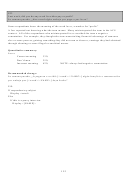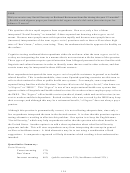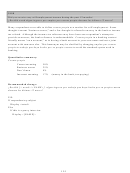Survey Methodology #2003-17 - The American Community Survey (Acs) En Espanol: Using Cognitive Interviews To Test The Functional Equivalency Of Questionnaire Translations - U.s. Bureau Of The Census Page 28
ADVERTISEMENT
ATTACHMENT I:
Question by Question Results of Cognitive Interviews Using the
ACS Spanish Language Instrument
MOREPER
Is there anyone else living or staying here?
¿Vive o se está quedando aquí alguien más?
Some respondents gave a correct answer to this question. Some probed for clarification before
offering an answer. The respondents who probed were not sure whom the phrase alguien más
referred to, specifically they wanted to know if this question was asking about people other than
family: “¿A parte de la familia?” It appears that most respondents interpret alguien más in a
similar manner. That is, most respondents interpret alguien más as people who are not related to
them.
Almost one half of respondents gave an incorrect answer to this question. The respondents who
answered incorrectly changed their answer after question R2 was asked. Specifically, these
respondents realized that MOREPER asked for anyone who lived in the household, including
children, spouses, and other family members or relatives. These respondents had inferred that
alguien más asked about people other than family members, so they initially responded no.
Hence, Question R2 helped respondents realize they should have included children, spouses, and
other relatives living in the household in MOREPER.
This is an example of a question that is grammatically correct. It has also been translated
correctly – that is, this question is asking for the same information the English question does.
However, the term alguien más does not elicit the information intended. As described above,
most respondents did not think about including other household members as they constructed
their response to this question. To avoid under-reporting, it may be useful to acknowledge the
respondent as a household member, and clarify this question asks who else lives there.
Quantitative summary:
Correct answer
25%
Incorrect answer (respondent changed answer after R2)
42%
Probed for clarification before offering an answer
33%
Suggested change:
A parte de usted, ¿quién más está viviendo o se está quedando aquí?
I - 1
ADVERTISEMENT
0 votes
Related Articles
Related forms
Related Categories
Parent category: Legal
 1
1 2
2 3
3 4
4 5
5 6
6 7
7 8
8 9
9 10
10 11
11 12
12 13
13 14
14 15
15 16
16 17
17 18
18 19
19 20
20 21
21 22
22 23
23 24
24 25
25 26
26 27
27 28
28 29
29 30
30 31
31 32
32 33
33 34
34 35
35 36
36 37
37 38
38 39
39 40
40 41
41 42
42 43
43 44
44 45
45 46
46 47
47 48
48 49
49 50
50 51
51 52
52








